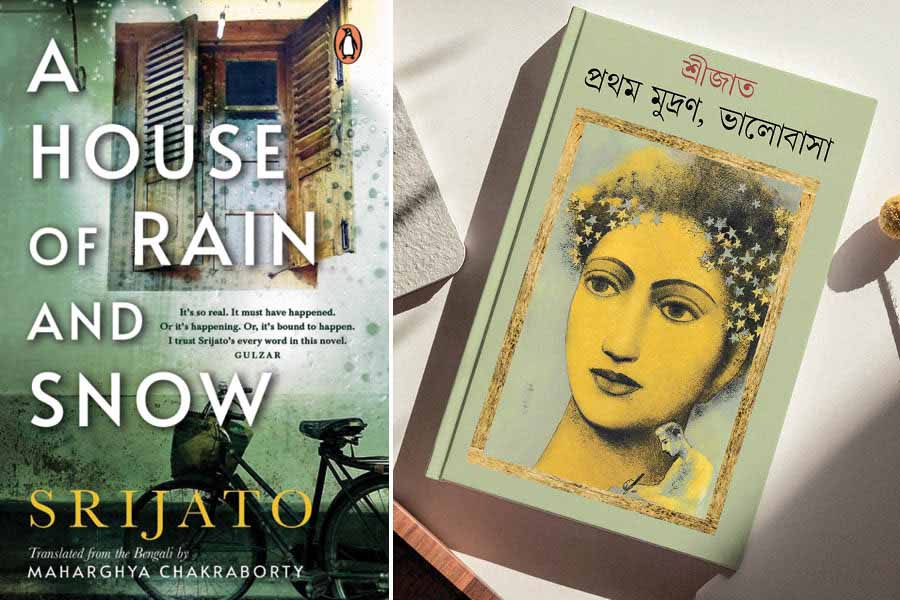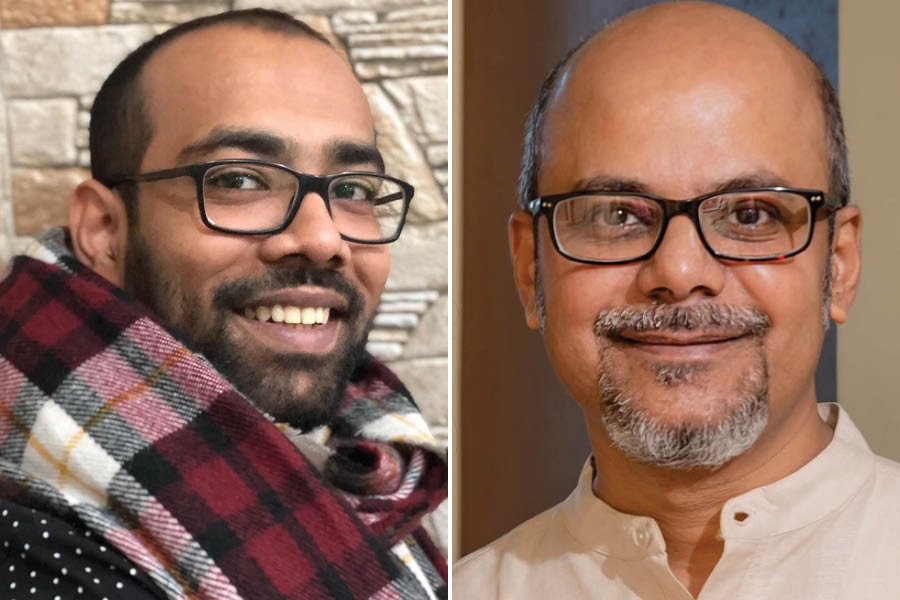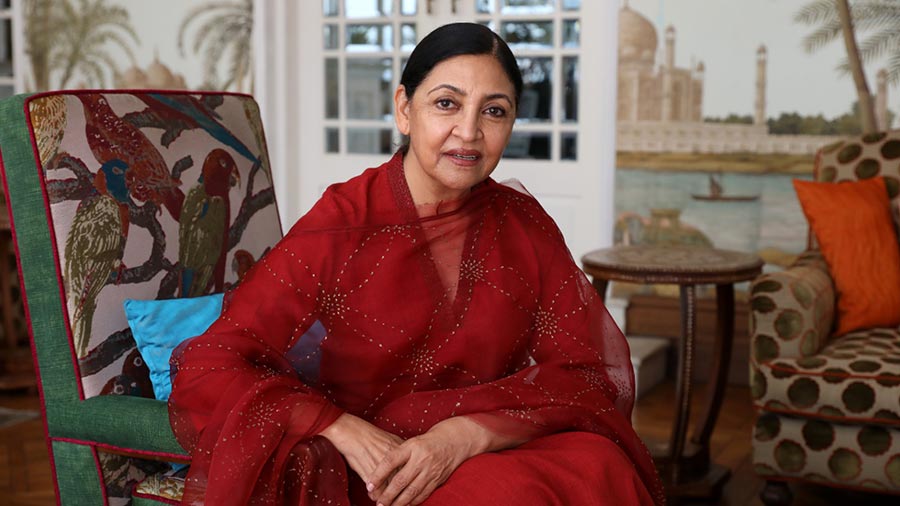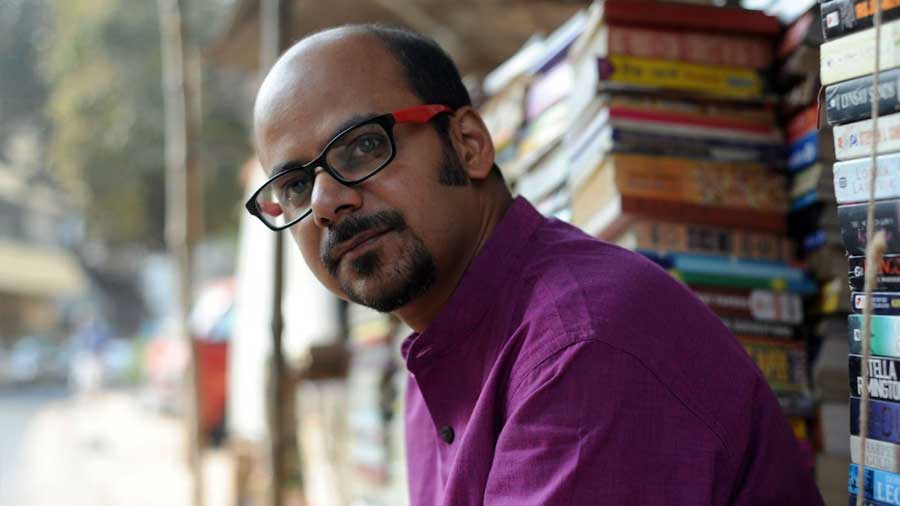Srijato, one of the most celebrated Bengali poet-lyricists of our times, can now be read in English. A House of Rain and Snow. a translation of Srijato’s latest work by Maharghya Chakraborty, will be available at the Book Fair to be held later this month.
The book published under Penguin’s Vintage imprint is Srijato’s tribute to an era, a walk down memory lane, the story of boyhood and its journey. It’s about love and relationships.
Pushkar, an offspring of the most incredible of times, has next to nothing to call his own. Except for a seasoned but out-of-work and disheartened father, and a defiant, uncompromising mother with a truly astounding gift for music. It is only in the gradually widening chasm between his parents that he discovers his world of poems, which he desperately tries to hide from everyone.
Saheli, a school friend who he is in love with, is the only one who gets to read Pushkar’s poetry. Abhijit, another friend from school, is unwilling to leave it all up to fate and insists on dragging Pushkar to meet Nirban and their independent publishing house — at least to ensure that Pushkar’s poems see the light of day.
In this entirely strange, magical and leisurely course of life swirling all around Pushkar, there is but one entity with whom he shares all his secrets. A milkwood tree, a privy to everything in his life. And so time moves on, leading him to eventually confront a truly secret equation of life — the change made possible by the transformative power of love.
From which Bengali book has A House of Rain and Snow been translated? How did the English title come about?
S: For the first time, a translation of my book has been published before the Bengali title. The Bengali book is going to be available at the Kolkata Book Fair (January 18 to 31, 2024). The novel has been published in a pujabarshiki. The name of the novel is Prothom Mudran Bhalobasha. The name of the English novel is A House of Rain and Snow. Maharghya has given the name. This was a working title at first. But eventually, we liked the name so much that it was finalised as the name of the book.
What or who were your inspirations while writing Pushkar’s story?
S: In recent times, I have not written anything more autobiographical than this book. I love to write from my life, from my experiences, from my memory. When I sat down to write this book, I had it in my mind to write about my boyhood — my friends, my experiences, my journey. I wanted to write about that time, too. The time which no longer exists, a time without the Internet. I wanted to pay tribute to my boyhood. Pushkar, you can say is 90 per cent me. Not only that, all the characters in the novel are more or less known to me (though I have not used their names). Hence, I had to take utmost care to write this novel since all the characters I am writing about do exist in person and I had to maintain the balance of not overloading the characters in the novel.
A writer writes a character with certain things in mind, as a reader the imagery changes because of their perceptions. How did you maintain the balance as a translator and reader?
M: As a reader and translator, a very fine balance has to be maintained. A translator has to be a very careful reader. Otherwise, there are chances of the translator’s experiences inflicting the text. When I first read the book, I found that the time that was portrayed is the same time I grew up in. When the characters walk along Panditiya Road or Golpark, I could actually visualise them in front of my eyes. I also maintained a safe distance since I never wanted my personal experiences to cause any hindrance to the novel.

The English translation (left) of Srijato’s ‘Prothom Mudran Bhalobasha’ Courtesy: Vintage - Penguin Books and Facebook / Srijato Bandyopadhyay
What crossed your mind first after reading the book?
S: I can answer this on behalf of Mahargya. He must have thought I have to translate this work also. Oh, my God!
M: No, no not at all. I was very relieved after reading the book. It is not too long. I usually take a long time to work. But after reading, I thought that it was manageable. The first thing that crossed my mind was about the time that the novel speaks of. I have also grown up at the same time. It’s that pre-Internet time. The book is something like looking at a snow globe. It exists only within that.
There is a milkwood tree in the story which plays a very important role . Though the story revolves around Pushkar, it is the tree that knows everything. Whom do you consider the main protagonist, the tree or Pushkar?
S: The tree in the story is like a confession box to whom Pushkar confesses everything. Pushkar definitely is the main protagonist; the tree is like a shadow of him. So, it can be the second protagonist. Everyone in their life picks up someone or something to whom or which they can talk about everything. For Pushkar it was the tree. Hadn’t the tree been there Pushkar would have been overwhelmed with thoughts. Then again, one needs a certain innocence to speak to a tree and Pushkar had that. The story also speaks of a certain era. A time that is non-existent now. Time also has a very important role in the story.
M: There are many untold words in the book. Like when Pushkar at the end presents the first copy of the book to the tree, it could be a way of saying goodbye to the tree, a farewell to his innocence, too. Whatever Pushkar does, will he be able to keep this innocence? I constantly had this feeling that he wanted to express that his innocence would be lost. Though these words are not very explicit, I felt it this way.
The book speaks a lot about memories. In fact, all the characters speak about memory. How much memory actually holds place in our lives?
S: Memory holds a big place. For me, it is the liveliest part of our life. Today’s morning or the food I had for lunch is memory now. Ninety per cent of our existence is memory. I don’t have any future memories. I really don’t know what’s going to happen at night today. I do have a dream for my future but there is no existence for it. For me the most important part of our existence is in fact more important than existence is memory. Whatever I write I do it from my memory, my experiences are my memories and hence memory has paramount importance in my writings as well as in my life. We all have a cocoon of ours and that is memory. It can be sad, it can be happy but we always walk down the memory lane.
M: Memory is incredibly important. In a broader perspective now, retaining a memory has become quite a political act because we don’t get to keep a memory. There’s a persistent attempt to push back memories into oblivion. A kind of denial comes to the forefront as if an incident has never happened. In this context, to one’s own self as a subject to experience memory is incredibly important at least to pass on that memory, someone has remembered it.
All the characters in the story have a kind of melancholy, they seem to be lonely. Then, there is love. Be it Pushkar, Saheli or the other characters, is love a kind of solace or rescue from loneliness?
S: I feel that every person’s journey is lonely. Even the most celebrated ones sometimes may feel lonely. Love may not be a rescue but definitely is a solace. The era that I am talking about in the story, during that time love definitely was a solace. I am not very definite about the present times. I really can’t talk about the present. During my boyhood days, love gave us comfort emotionally. Even a simple break-up would be heart-wrenching. Love conquered our lives. In fact, it did have an enormous effect on any kind of art, too. Now, I feel we are not that organic anymore. For my characters, love is like a support kind of shelter to fall back on, especially for Pushkar.
M: There is a balance of both in our lives. Denying loneliness or love is somewhat denying the truth because almost everyone experiences both. A very important point between Pushkar and Saheli’s love is that there is no possession in their love. There is no selfishness. This can be incredibly powerful and liberating. The feeling of love is powerful.
Have you ever felt that the translation has drifted from what you wanted to say?
S: Absolutely not. In fact, Maharghya has done an excellent job. Maharghya is an excellent translator. Besides that, he is a Bengali, from Kolkata and almost in the same age group as me. So he has seen the time I am talking about in the novel. All these things are very important in translation. I don’t mean to demean anyone but if this novel was translated by an Irish person born in1960 the story would have taken a different shape. Since he was also associated with the time I am talking about, the city I am talking about a kind of relationship has developed and hence the translation is so close.
How about the translation of the poems?
S: Excellently done. To be very honest I am liking this novel of mine because it is translated. I usually don’t like my writings later but this time I felt quite satisfied. He has done it with utmost care.
M: I like translating poetry but I am most afraid of it. It’s like a paradox. Translating poems is a very difficult job. The novel itself has a lot of portions that are very poetic even though not poetry. There is an inherent vein of poetry even in prose. This was really very enriching for me. When something like this happens, it becomes easier to deal as a translator.
One last question, music also plays a role in the story. There are many mentions of raga Bihag. Is there any specific reason behind this?
S: Bihag is my favourite raga. Since childhood I have been very fond of it. Though the raga is an expression of eroticism, for me there’s an element of pathos in it as well. This blend is difficult to find in any other raga. If you listen to Basant, there’s a joyous feeling, similarly Bageshri is an expression of sorrow but in Bihag, there is a blend of love, anticipation, a love tryst along with expressions of loss and separation. In the story, Pushkar is in a state where he is unable to give up completely to love and there is a kind of melancholy, too, within him. So I thought Bihag would be the best option.


